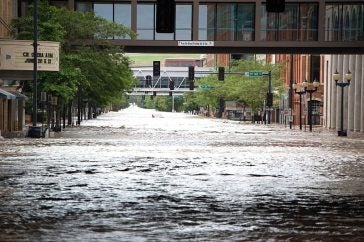
The effects of climate change on water resources are being felt throughout the world – everything from acute water shortages and threatened water supplies to extreme flooding and altered ecosystems.
In fact, the United Nations cites water as the primary medium through which climate change is being experienced.
How are scientists working to understand and project the connections between climate change and water resources? What are communities, policy experts and decision-makers doing to meet the challenge and develop solutions? These topics and more will take center stage at Metcalf Institute’s 2019 Annual Public Lecture Series, June 3–7, at the University of Rhode Island Graduate School of Oceanography.
With the generous support of donors, the weeklong series will bring leaders in science, policy and journalism to the URI to explore the latest research, as well as innovative and collaborative efforts to plan for an uncertain future.
All lectures are free and will be held in Corless Auditorium at URI’s Graduate School of Oceanography on the Narragansett Bay Campus, 215 South Ferry Road in Narragansett. Parking with maximum accessibility is available the west end of the Watkins Building and in the lower lot of the Ocean Science and Exploration Center.
Monday, June 3
Jeff Goodell, Author and contributing editor to Rolling Stone magazine
The Water Will Come: Rising Seas, Sinking Cities, and the Remaking of the Civilized World
Book-signing to follow lecture
Sea levels are projected to rise fast in the coming decades, with profound implications for virtually every coastal city and town. Goodell will discuss the economic, environmental and political implications of rising seas, how cities around the world are preparing, and the challenges of reporting on this global-scale phenomenon.
Tuesday, June 4
Manny Teodoro, Texas A&M University
The Water Infrastructure Crisis in the U.S. and a Roadmap for Reform
America’s water infrastructure challenges emerge in large part from the patchwork quilt of institutions that own, manage, finance, and regulate the supply. Teodoro offers a roadmap for water governance reforms to align institutional incentives with sustainable, affordable and effective infrastructure.
Wednesday, June 5
Twila Moon, National Snow and Ice Data Center
From the Ice Sheet to Your Doorstep: The Expanding Impacts of Global Ice Loss
Glaciers and ice sheets around the globe are shrinking and disappearing, changing ocean properties and ecosystems and raising global sea levels. Moon will explore global ice loss, the implications for communities and economies, and the options for positive action to shape the future of ice on Earth.
Thursday, June 6
Eric Tate, University of Iowa
Floods and Community Resilience
Water and destruction to property generally get the attention when floods hit, but what about the impacts on people? Tate will describe what scientists know about the effects of flood disasters on communities and how vulnerability drives human impacts.
Friday, June 7
Branko Kerkez, University of Michigan
Smart Water Systems: Could Windshield Wipers Help Prevent Floods?
In this era of smart phones, digital assistants, and self-driving cars, can we build autonomy and intelligence into water systems? New low-cost sensors and controllers could reduce flooding impacts and improve water quality. Kerkez will describe the real-world test beds he is developing for smart stormwater systems.
